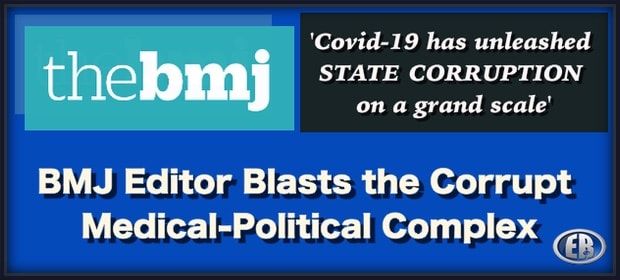
ER Editor: The picture inserts below are taken from scenes of mass testing in Liverpool that began this week.
This story was also picked up by the UK site Lockdown Sceptics. Of note:
This doesn’t happen every day. The Executive Editor of the BMJ, Kamran Abbasi, has written a blistering editorial taking aim at the “state corruption” that Covid has unleashed.
And they conclude:
For an editorial like this to appear in a leading scientific journal is unprecedented. Worth reading in full.
Kamran Abbasi is mad as hell and he’s not going to take it anymore.
Stop Press: According to the Sunday Times, one of the Britain’s most influential lobbyists secretly served as an adviser to a health minister for six months – before sending sensitive information on lockdown policy to paying clients. This was the headline finding of a major investigation by the paper into privileged access for friendly lobbyists and £1.5 billion worth of contracts awarded to Tory-linked companies. This will be more grist to Kamran Abbasi’s mill.
********
Covid-19: politicisation, “corruption,” and suppression of science
BMJ 2020; 371 doi: https://doi.org/10.1136/bmj.m4425 (Published 13 November 2020)Cite this as: BMJ 2020;371:m4425
-
Kamran Abbasi, executive editor
Politicians and governments are suppressing science. They do so in the public interest, they say, to accelerate availability of diagnostics and treatments. They do so to support innovation, to bring products to market at unprecedented speed. Both of these reasons are partly plausible; the greatest deceptions are founded in a grain of truth. But the underlying behaviour is troubling.
Science is being suppressed for political and financial gain. Covid-19 has unleashed state corruption on a grand scale, and it is harmful to public health.1 Politicians and industry are responsible for this opportunistic embezzlement. So too are scientists and health experts. The pandemic has revealed how the medical-political complex can be manipulated in an emergency—a time when it is even more important to safeguard science.
The UK’s pandemic response provides at least four examples of suppression of science or scientists. First, the membership, research, and deliberations of the Scientific Advisory Group for Emergencies (SAGE) were initially secret until a press leak forced transparency.2 The leak revealed inappropriate involvement of government advisers in SAGE, while exposing under-representation from public health, clinical care, women, and ethnic minorities. Indeed, the government was also recently ordered to release a 2016 report on deficiencies in pandemic preparedness, Operation Cygnus, following a verdict from the Information Commissioner’s Office.34
Next, a Public Health England report on covid-19 and inequalities. The report’s publication was delayed by England’s Department of Health; a section on ethnic minorities was initially withheld and then, following a public outcry, was published as part of a follow-up report.56 Authors from Public Health England were instructed not to talk to the media. Third, on 15 October, the editor of the Lancet complained that an author of a research paper, a UK government scientist, was blocked by the government from speaking to media because of a “difficult political landscape.”7

Now, a new example concerns the controversy over point-of-care antibody testing for covid-19.8 The prime minister’s Operation Moonshot depends on immediate and wide availability of accurate rapid diagnostic tests.9 It also depends on the questionable logic of mass screening—currently being trialled in Liverpool with a suboptimal PCR test.1011
The incident relates to research published this week by The BMJ, which finds that the government procured an antibody test that in real world tests falls well short of performance claims made by its manufacturers.1213 Researchers from Public Health England and collaborating institutions sensibly pushed to publish their study findings before the government committed to buying a million of these tests but were blocked by the health department and the prime minister’s office.14 Why was it important to procure this product without due scrutiny? Prior publication of research on a preprint server or a government website is compatible with The BMJ’s publication policy. As if to prove a point, Public Health England then unsuccessfully attempted to block The BMJ’s press release about the research paper.
Politicians often claim to follow the science, but that is a misleading oversimplification. Science is rarely absolute. It rarely applies to every setting or every population. It doesn’t make sense to slavishly follow science or evidence. A better approach is for politicians, the publicly appointed decision makers, to be informed and guided by science when they decide policy for their public. But even that approach retains public and professional trust only if science is available for scrutiny and free of political interference, and if the system is transparent and not compromised by conflicts of interest.
Suppression of science and scientists is not new or a peculiarly British phenomenon. In the US, President Trump’s government manipulated the Food and Drug Administration to hastily approve unproved drugs such as hydroxychloroquine and remdesivir.15 Globally, people, policies, and procurement are being corrupted by political and commercial agendas.16
The UK’s pandemic response relies too heavily on scientists and other government appointees with worrying competing interests, including shareholdings in companies that manufacture covid-19 diagnostic tests, treatments, and vaccines.17 Government appointees are able to ignore or cherry pick science—another form of misuse—and indulge in anti-competitive practices that favour their own products and those of friends and associates.18
How might science be safeguarded in these exceptional times? The first step is full disclosure of competing interests from government, politicians, scientific advisers, and appointees, such as the heads of test and trace, diagnostic test procurement, and vaccine delivery. The next step is full transparency about decision making systems, processes, and knowing who is accountable for what.
Once transparency and accountability are established as norms, individuals employed by government should ideally only work in areas unrelated to their competing interests. Expertise is possible without competing interests. If such a strict rule becomes impractical, minimum good practice is that people with competing interests must not be involved in decisions on products and policies in which they have a financial interest.
Governments and industry must also stop announcing critical science policy by press release. Such ill judged moves leave science, the media, and stock markets vulnerable to manipulation…
************

••••
The Liberty Beacon Project is now expanding at a near exponential rate, and for this we are grateful and excited! But we must also be practical. For 7 years we have not asked for any donations, and have built this project with our own funds as we grew. We are now experiencing ever increasing growing pains due to the large number of websites and projects we represent. So we have just installed donation buttons on our websites and ask that you consider this when you visit them. Nothing is too small. We thank you for all your support and your considerations … (TLB)
••••
Comment Policy: As a privately owned web site, we reserve the right to remove comments that contain spam, advertising, vulgarity, threats of violence, racism, or personal/abusive attacks on other users. This also applies to trolling, the use of more than one alias, or just intentional mischief. Enforcement of this policy is at the discretion of this websites administrators. Repeat offenders may be blocked or permanently banned without prior warning.
••••
Disclaimer: TLB websites contain copyrighted material the use of which has not always been specifically authorized by the copyright owner. We are making such material available to our readers under the provisions of “fair use” in an effort to advance a better understanding of political, health, economic and social issues. The material on this site is distributed without profit to those who have expressed a prior interest in receiving it for research and educational purposes. If you wish to use copyrighted material for purposes other than “fair use” you must request permission from the copyright owner.
••••
Disclaimer: The information and opinions shared are for informational purposes only including, but not limited to, text, graphics, images and other material are not intended as medical advice or instruction. Nothing mentioned is intended to be a substitute for professional medical advice, diagnosis or treatment.




